Predicting The Future
Your brain is imprisoned inside the silent, dark cage that makes up your skull from the moment you are born until the moment you take your final breath. It continuously absorbs sense information from the outside environment through your eyes, ears, nose, and other sensory organs on a daily basis. The majority of us do not experience this data as significant sights, sounds, smells, or other experiences. It is merely a barrage of meaningless light rays, chemicals, and air pressure variations.
Since the brain is essentially trapped in a sealed, black bone shell called the skull, it cannot view anything. It accomplishes everything by absorbing multiple signals and inputs from the environment and using them all to create a coherent, clear picture of the world around us.
It's astonishing that everything that happens during this procedure occurs somewhat beforehand. The way the brain functions is predictive; it continuously makes predictions about the future based on the past. The skill, known as anticipatory timing, is extremely simple to see in professional athletes, singers, and sportsmen whose brains can foresee tiny events far faster and more precisely than the rest of us. The cerebellum and the basal ganglia, two different regions of the brain, are thought to be responsible for this, according to researchers at UC Berkeley.












